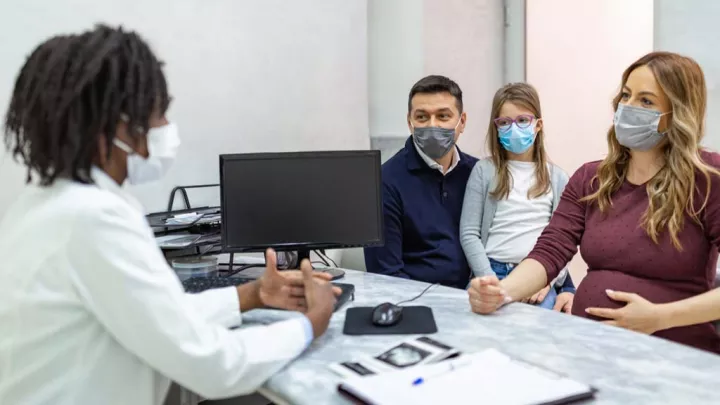
How Does Bladder Exstrophy Impact Mental Health?
Research from the Division of Urology at Children’s Hospital Los Angeles is shedding new light on an area that traditionally has received scant attention: How do bladder exstrophy and related conditions affect an individual’s mental health and quality of life?

To answer this question, a team led by Evalynn Vasquez, MD, MBA, and Michelle SooHoo, PhD, conducted an extensive scoping review of published articles on the exstrophy-epispadias complex—a group of rare congenital conditions affecting the urinary system that often result in incontinence.
Team members have presented the study at the Society of Pediatric Urology Fall Congress, the 32nd European Society for Pediatric Urology Congress and the Canadian Urological Association Annual Meeting—where it received the Best Pediatric Poster award.
“There hasn’t been a good understanding of how these conditions, as well as the surgeries to treat them, impact mental health and quality of life,” says Dr. SooHoo, a full-time, dedicated psychologist in the Division of Urology. “Our goal was to synthesize the existing literature so we could see what has been studied, and where the gaps are.”
Key findings
Very few studies have looked specifically at mental health in these patients. But buried deep within papers focused on exstrophy surgical procedures, the team discovered insights and findings around mental health, psychosocial functioning and quality of life outcomes.
The group screened more than 5,400 papers and included 66 articles in the review, comprising results from 2,148 unique patients. Their research uncovered several key themes:
- Mental health and quality of life change across the life course. Not surprisingly, the study found that children and adults with exstrophy express mental health challenges differently. Children are more likely to externalize frustrations—through tantrums or disruptive behaviors—while adolescents and adults tend to internalize them, often causing symptoms of anxiety.
Are those symptoms enough to warrant a diagnosis of anxiety? “The published research is not clear on that point,” Dr. SooHoo says. “That is a gap we want to fill in the future.” - For children, quality of life improves after surgery. In general, children experienced a higher quality of life after reconstructive surgery. That gain is likely due to being continent and able to participate in more activities with their peers.
- Adolescents can struggle with self-care. Both adolescents and adults reported lower quality of life after surgery in two areas: general health and self-care. Papers in the review did not provide details, but the researchers believe it is most likely because patients must routinely empty their bladders via catheterization after surgery.
“We see this in the literature in other areas, where adolescents in general have a harder time than children in taking care of their chronic illnesses,” Dr. SooHoo says. “That difficulty can continue into adulthood as well.” - Overall quality of life is equal to the general population. With the exception of health and self-care, though, the review found that many individuals with exstrophy report a quality of life that matches that of their peers.

Assessing surgical readiness
Dr. Vasquez, Associate Chief of Urology at CHLA, says the results highlight the need for psychological support for children with bladder exstrophy and related conditions.
Children’s Hospital Los Angeles is one of just three centers in the country to have a full-time psychologist dedicated specifically to supporting patients and families in pediatric urology.
“I would encourage other pediatric urologists to refer their patients to a psychologist as part of their care management,” Dr. Vasquez says. “This is a population of young people who have unique experiences and needs.”
The researchers’ next step is to complete a prospective study on how to better prepare children and families psychologically for urinary reconstructive surgeries. Dr. SooHoo and the team are conducting in-depth interviews with children and parents of children who have undergone these surgeries in the past five years at Children’s Hospital Los Angeles.
“It’s critical that patients and families are psychologically ready for this major reconstruction,” Dr. Vasquez says. “Our goal is to learn from other families’ experiences to enhance pre-surgical screening for readiness and provide patients with more resources to support their mental health and well-being.”
Additional co-authors on the review poster were Zoë Baker, PhD, MPH; Lynn Kysh, MLIS; YuDing Wang, MD, MSc; Arthi Hannallah, MD; Zorash Montano, PhD; and Joan Ko, MD.


